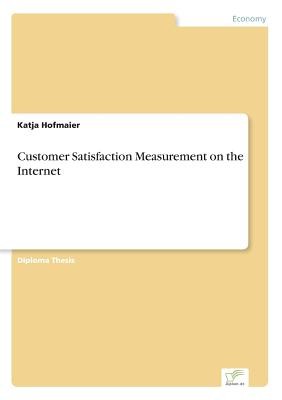
- We will send in 10–14 business days.
- Author: Katja Hofmaier
- Publisher: Diplom.de
- Year: 1999
- Pages: 108
- ISBN-10: 3838615808
- ISBN-13: 9783838615806
- Format: 14.8 x 21 x 0.7 cm, softcover
- Language: English
- SAVE -10% with code: EXTRA
Reviews
Description
Inhaltsangabe: Abstract: Based on the Expectancy Disconfirmation Model as the underlying construct, methods to measure customer satisfaction with products and the steps to be undertaken in the research process are investigated. The measurement of Derived Satisfaction using (dis)confirmation was found to be the appropriate approach to 'CS' measurement. The Critical Incidents Technique can be used to assess the influence of exceptional experiences and the customers' evaluation of value-added services. The method of Focus Group interviewing is most appropriate for the exploration of important product attributes with customers while In-Depth Interviews structure salespeople- and executive interviews. It was also shown that during the research process, several points specific to 'CS' measurements need to be accounted for. The Internet services currently used by marketing and social researchers include E-mail, mailinglists, newsgroups, Internet Chat, the World Wide Web (WWW) and Virtual Worlds. Virtual Worlds, being most advantageous for observational studies, are not useful for customer satisfaction research. Virtual Communities, in turn, have some promising characteristics for future use. Internet research methods based on these services include E-mail surveys, WWW-surveys and online Focus Groups. Common advantages of E-mail- and WWW-surveys include administrative and response speed, cost savings and global reach of respondents. Their greatest common disadvantage is the non-representativeness of the respondents for the larger population as well as their self-selection. Unless access is restricted to a known population, probability sampling is impossible when using the World Wide Web. Because of its serious disadvantages, the use of online Focus Groups is not (yet) advisable. Based on these insights, the Internet was found to be an advantageous medium for customer satisfaction studies only if specific conditions are met. Companies need to investigate on a case-by-ca
EXTRA 10 % discount with code: EXTRA
The promotion ends in 18d.17:13:41
The discount code is valid when purchasing from 10 €. Discounts do not stack.
- Author: Katja Hofmaier
- Publisher: Diplom.de
- Year: 1999
- Pages: 108
- ISBN-10: 3838615808
- ISBN-13: 9783838615806
- Format: 14.8 x 21 x 0.7 cm, softcover
- Language: English English
Inhaltsangabe: Abstract: Based on the Expectancy Disconfirmation Model as the underlying construct, methods to measure customer satisfaction with products and the steps to be undertaken in the research process are investigated. The measurement of Derived Satisfaction using (dis)confirmation was found to be the appropriate approach to 'CS' measurement. The Critical Incidents Technique can be used to assess the influence of exceptional experiences and the customers' evaluation of value-added services. The method of Focus Group interviewing is most appropriate for the exploration of important product attributes with customers while In-Depth Interviews structure salespeople- and executive interviews. It was also shown that during the research process, several points specific to 'CS' measurements need to be accounted for. The Internet services currently used by marketing and social researchers include E-mail, mailinglists, newsgroups, Internet Chat, the World Wide Web (WWW) and Virtual Worlds. Virtual Worlds, being most advantageous for observational studies, are not useful for customer satisfaction research. Virtual Communities, in turn, have some promising characteristics for future use. Internet research methods based on these services include E-mail surveys, WWW-surveys and online Focus Groups. Common advantages of E-mail- and WWW-surveys include administrative and response speed, cost savings and global reach of respondents. Their greatest common disadvantage is the non-representativeness of the respondents for the larger population as well as their self-selection. Unless access is restricted to a known population, probability sampling is impossible when using the World Wide Web. Because of its serious disadvantages, the use of online Focus Groups is not (yet) advisable. Based on these insights, the Internet was found to be an advantageous medium for customer satisfaction studies only if specific conditions are met. Companies need to investigate on a case-by-ca


Reviews